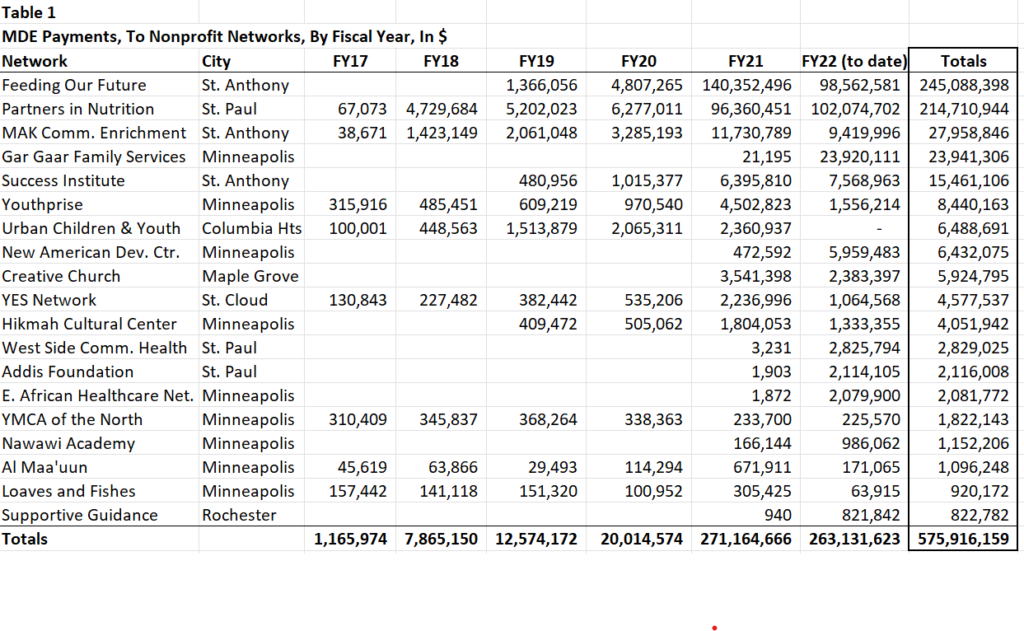The explosive growth of Minnesota’s free food industry
Giving away free food to Minnesota children may be the fastest growing industry in the state, judging by the numbers involved in the alleged Feeding Our Future scandal.
The two federal programs overseen by the state’s Department of Education (MDE) — the Child and Adult Care Food Program (CACFP) and the Summer Food Service Program — used to be a much smaller deal, just a few years ago. Their explosive growth has strained the ability of the Department to provide adequate oversight.
The vast majority of the participants in the program were (and still are) schools (public, private, and charter) who operate the better-known school lunch program. Childcare facilities and community churches are also frequent participants. Total federal spending on the two programs in Minnesota in Fiscal Year 2018 amounted to $75.8 million. In FY 19, the number rose slightly to $80.5 million. Then came the pandemic.
Concerned that schools would be closed and unable to feed kids, the Feds relaxed the rules so that just about any location or entity could serve as a food distribution site. In Fiscal Year 2020, the amount spent in Minnesota almost doubled, to $153.8 million, with all of the growth occurring in the Summer Food program. What followed should provide a cautionary tale about throwing money at government programs, even during times of emergency.
Nothing could have prepared MDE for Fiscal Year 2021. That following year, a single nonprofit — Feeding Our Future — received an amount (over $140 million) nearly as large as that consumed by the entire program the previous year.
The table below shows the growth of the “nontraditional” segment of the free food industry. These are the largest nonprofit providers in the Minnesota program, who aren’t large public school systems or childcare networks.

You will see some familiar names on the list above, nonprofits with long histories and well-earned reputations for doing good work in their communities.
The top two names on the list — Feeding Our Future and Partners in Nutrition (aka Partners in Quality Care) — were suspended from the program by MDE in the wake of FBI raids conducted on Jan. 20. None of the other names were mentioned by the FBI in their search warrants. Not one person has been arrested or charged in the alleged scandal.
The East African Healthcare Network had previously been sponsored by Partners in Nutrition before spinning off (curiously, the contact person listed in 2020 was Aimee Bock of Feeding Our Future). Gar Gaar Family Services was suspended from program participation by MDE in December 2021. In FY 21, the contact person for Urban Children and Youth is given as Aimee Bock of Feeding Our Future.
As the table shows, non-traditional nonprofit networks represented only a small part of the free food landscape in Fiscal Year 2017. That changed with the arrival of Partners in Nutrition, a startup nonprofit with a mission of helping other nonprofits tap into federal free-food money. The nontraditional nonprofits alone now consume an amount four times the size of the entire program just a few years ago.
Not familiar with this new form of service provider, MDE struggled with how to review nonprofits’ applications and oversee their work. Partners filed a lawsuit which resulted in their being allowed into the program. In a preview of arguments to come, Partners’ then-CEO was quoted in 2016 as saying, in their battle with MDE,
If you think about the number of hours of staff time, the number of documents that have gone back and forth, and for what? To prevent us from feeding hungry kids. And furthermore, to prevent more federal dollars from coming to Minnesota. That doesn’t add up.
But beyond the challenge of overseeing dozens of new sponsors and hundreds of new sites, the sheer size of some of these new locations must have posed a challenge for MDE’s program oversight.
The table below shows the seven largest free food distribution sites run by nonprofits in Minnesota. These sites rival the capacities available at the state’s largest public schools. To be clear, not one of these seven sites were mentioned in the FBI search warrants.

For six of the seven sites, the figures shown are for maximum summer capacity. The locations operate more modest efforts during the school year. Still, MDE was tasked in the summers of 2020 and 2021 with oversight of massive new operations, while the agency’s staff was still working remotely due to COVID.
Shamsia Hopes, shown above, features their food program prominently on their website. The charity’s work in the program was also profiled in this lengthy piece in the Sahan Journal from May 2021. Shamsia Hopes reports operating ten sites around the metro region.
In a classic baby/bathwater situation, Shamsia Hopes — along with unrelated large sites in St. Paul and Bloomington and hundreds of smaller sites throughout the state — were shut down when MDE suspended the participation of Feeding Our Future and Partners from the programs.
Summer 2022 will be here soon enough. With the two largest nonprofit networks currently barred from participating in free food programs, it’s not clear how the system will adapt.